2015 年广东成人学位英语真题及答案
Part I
Dialogue Completion (15 Points)
Directions: There are 15 short incomplete dialogues in this part, each followed by
4 choices marked A, B, C and D. Choose the best one to complete the dialogue and
mark your answer on the ANSWER SHEET.
1. Speaker A: I want to take part in the school Talent Show.
Speaker B: That’s nice! ______.
Speaker A: Well, I like to sing.
A. I’m behind you 100 percent.
B. What would you want to do?
C. Are you sure?
D. Go for it.
2. Mike: Do you mind if I open the door?
Susan: ______. The wind will blow my papers around.
A. Please don’t.
B. Just do it.
C. No, go right ahead.
D. It’s up to you.
3. Speaker A: I was hoping you would stay on a bit longer.
Speaker B: ______, but I have to get up early tomorrow.
A. I think so
C. Thank you
B. I wish I could too
D. I really have to go.
4. Speaker A: Guess what, mum? I got the scholarship!
Speaker B: ______. I’m so pround of you.
A. Well done!
C. You are kidding!
B. I like it.
D. Good luck.
5. Speaker A: Good morning, Mr.Thomas. Dou you have time now?
Speaker B: ______.
Speaker A: I would like to discuss with you about my job.
A. Let me see.
B. Not now.
C. Sure. What is it?
D. How long will it take?
6. Tim: You look unhappy, ______?
Linda: I’m having some problems with maths.
A. What do you need
C. You know what
B. What’s new
D. What’s up
7. Speaker A: What a wonderful dinner!
Speaker B: Thank you. ______.
A. I hope you like it.
C. Is everything fine?
B. I’m glad you’re enjoying it.
D. You are welcome.
8. Marie: Hey, Greg. Let’s go to the County Show this weekend.
Greg: ______ I have to do my school project, remember?
A. As you like.
C. Do we have to?
B. I’d be glad to.
D. Why not?
9. Dad: Do you want any breakfast?
Emma: ______. I’m really hungry.
�
A. I’m not sure
B. Well, if you insist
C. I can go without it
D. Yes, I do
10. John: I’m tired. I’m having next week off.
Lily: ______. The break will do you good.
A. What happened to you?
B. Are you serious?
C. That’s a good idea.
D. You don’t really mean it, do you?
11. Mark: I don’t know about you, but I’m fed up with this wet weather.
Linda: ______. I’m just looking for some sunshine.
A. Me, too
C. Who knows?
B. Neither do I.
D. It’s Ok.
12. Mary: What was the match like?
Lucas: ______, especially when Messi scored in the closing minutes.
A. It made me sleepy
B. It was a joke
C. It was a dull game
D. It was really exciting
13. Speaker A: Could I meet with you to dicuss the preparation?
Speaker B: Good. We could meet on Tuesday or Wednesday. ______?
Speaker A. Tuesday would be good for me.
A. How about you
B. Which day would you prefer
C. Any other suggestions
D. Is it good for you
14. Husband: You aren’t going out dressed like that, are you?
Wife: ______? I thought I looked really smart.
A.
B.
C.
D.
Can you believe it
Be nice, Ok
How do you think of it
Why? What’s wrong with it
15. Josh: Give me your homework so I can copy it.
Ellen: ______ You should do it yourself.
A.
B.
C.
D.
Take it.
No way!
I’ll tell you what.
What seems to be the problem?
Part II Reading Comprehension (40 Points)
Directions: There are 4 passages in this part. Each o f the passages is followed
by 5questions or unfinished statements. For each of them there are 4 choices marked
A, B, C and D. Choose the best one and mark your answer on the ANSWER SHEET.
Passage One
A few centuies ago, people looked at the birds and wondered what it would be like
to fly like them. There were stories of heroes who glued bird feathers on their arms
and flew up into the sky. About 500 years ago, some people dreamed a different dream.
Instead of flying up to the sky, they dreamed of falling from the sky!
In the 15th century, Italian inventors designed a cone-shaped(锥形) device that was
supposed to bring a man down safely from a great height. The operator held on to
�
a handle with a straps strapped to his waist. This was the first known design for
a parachute (降落伞).
Even the great inventor Leonardo da Vinci sketched a type of parachute. His parachute
design was in the shape of pyramid(金字塔). Other inventors also sketched their own
designs for a parachute. Unfortunately, these were only designs on paper and no one
tested them.
A Croatian inventor named Fausto Veranzio looked at Leonardo da Vinci’s parachute
design and replaced the pyramid shape with one that looked like a sail from a ship.
When Veranzio was 65years old, he fell ill. Thinking he would not live longer, he
decided to try out his parachute invention. He built his parachute using wood and
cloth. Straping his invention to his waist, he jumped off the tall bell tower in
his city. He landed safely! He was supposedly the first man to successfully use a
parachute. However, some other people thought this story was not true. If that was
the case, then the first person to successfully use a parachute would go to a
Frenchman named Louis-Sebastien Lenormand in 1783.
16. The first known parachute was designed by ______.
A. Frenchman
C. Croatians
B. Italian
D. Englishmen
17. Leonardo da Vinci’s parachute was shaped like a ______.
A. cone
B. feather
C. pyramid
D. sail
18. Which of the following is about Fausto Veranzio is true?
A. He copied da Vinci’s parachute design.
B. He made his parachute with feather and wood.
C. He experimented with his parachute many times.
D. He decided to try his parachute after he was seriously ill.
19. As for the first man who successfully used a parachute, ______.
A. it was said to be Leonardo da Vinci
B. we know for sure he was Veranzio
C. there were some historical records
D. we don’t know for sure yet
20. The passage is mainly about ______.
A. the origin of the parachute
B.The dreams of flying and falling
C. the courage of dropping from the sky
D. the application of parachute invention
Passage Two
Out of all the students who enroll in a massive open online course(MOOC), only about
5 percent complete the course and receive a certificate accomplishment. This
statistic is often cited as evidence that MOOCs are fatally flawed(缺陷的)and offer
little educational value to most students. Yet more than 80 percent of students who
fill out a post-course survey say they met their primary objective. How do we look
at these two facts?
�
We’re used to focusing on completion rates in higher education, but they’re not
the only-or even the most meaningful – indicator of engagement in open online
courses. With no cost to enroll, no punishment for dropping out, and little reward
for actually earning a certificate, MOOCs are fundamentally different from
traditional calssess – and students use them in fundamentally different ways.
Data from more than 1.8 million students erolled in 36 MOOCs offered by the University
of Pennsylvania show that students treat MOOCs like a buffet (自助餐), sampling the
material according to their interests and career goals. Some are curious about the
subject matter and just watch one or two video lectures; others use the discussion
forums to connect with their intellectual peers around the world. Of all enrolled
students, nearly 60 percent watch at least one vedio, complete at least one
assignment, or post at least once in a forum.
So focusing on the tiny fraction of students who complete a MOCCs is misguided.
The more important number is the 60 percent engagement rate. Students may not finish
a MOOC with a certificate of accomplishment, but the courses nonetheless meet the
educational goals of millions.
21. What do we learn about MOOCs from Para.1?
A. There seems to be conflicting statistics about MOOCs.
B. It turns out that MOOCs have failed people’s expectations.
C. Most students find it hard to judge the value of MOOcs.
D. The educational value of MOOCs is well acknowledged.
22. In Para.2, the author stresses ______.
A. the primary objective of MOOC students
B. the significance of competion rates in education
C. the strengths and weakness of open online courses
D. the differences between MOOCc and trditional classes
23. According to Para. 3, students choose MOOCs for the following reasons EXCEPT
______.
A. earning a certificate
B. improving job-related skills
C. meeting their interest in the subjects
D. exchanging ideas with students worldwide
24. The sentence “students treat MOOCs as a buffet” (Para.3) ______.
A. emphasizes the core value of MOCCs
B. demonstrates the daily operation of MOOCd
C. indicates students are free to choose MOOC resources
D. explains what students learn from MOOC courses
25. What is the author’s attitude toward MOOCs?
A. Critical.
B. Supportive.
C. Indifferent.
D.
Neutral.
Passage Three
Whether you are hiking through 徒步 the magnificent redwoods of Northern California,
�
sleeping under the brilliant stars of the Texas sky or watching the sun rise across
the rocky cliffs of Maine, expecting the outdoor world can be inspiring, thrilling,
and deeply satisfying. And one of the best ways to enjoy the abundant gifts of the
natural world is simple, inexpensive, and available to almost every one. Let’s go
camping.
When you camp, you create a “home away from home” in the fresh air. You don’t
need a lot of fency equipment to enjoy camping. What you need is simply a tent large
enough for your family. Practice setting up the tent at home to make sure you are
familiar with the process before you go camping.
Once you find a good site, it’s time to set up tent. Your first job is to set up
your tent. Remove all sticks and rocks from the area. Spread a tarp (防水帆布) over
the area where your tent will sit. Set up the tent and be sure to stake it down firmly,
even if the weather is mild. Otherwise, strong wind can blow your tent away.
Next, you’ll need some firewood for a campfire. If gathering wood is illegal at
your campground, you must buy it at the camp store. If gathering dead wood is
permitted, go on a firewood-hunting journey and bring in a good supply of wood for
your campsite, pile the wood safely away from the campfire ring and where no one
will trip over the wood or hurt his or her legs on sharp branches.
Being a responsible camper requires that you follow the rules of the campground.
Do not burn food or plastic in your campfire. Make sure that you leave your campsite
in good condition for the next campers. Just before leaving the site, make a final
check to be certain that your campfire is completely out. Pour water on the ashes
just to be safe!
26. As is suggested by the aurhor, you should practice setting up your tent ______.
A. before the weather turns bad
B. before your first camping up
C. after having selected your campsite
D. once you have decided where to go
27. What is the first thing you should do after choosing a campsite?
A. Gather firewood.
B. Spread a tarp on the ground.
C. Set up the tent.
D. Remove sticks and rocks from the tent area.
28. You can gather firewood only ______.
A. after you are sure that it is permitted
B. after you are certain that no one will get hurt
C. if there is no camp store nearby
D. if firewood is out of stock in a camp store
29. The last thing you should do before leaving your campsite is ______.
A. burn all the trash
B. clean the campsite
C. pour water on the ashes
�
D. collect all the rubbish
30. The passage is mainly about ______.
A. safety measures a camper should take
B. problems you may face as a camper
C. what you need to know about camping
D. what you need to bring along for camping
Passage Four
Every country has secret services to help protect it against serious threats from
terrorists, major criminals or even from other countries. People who threaten to
harm a country always plot in secret, so the intelligence agencies have to work in
secret to find out what is being planned before it happens, so that it can be prevented.
They do that in many different ways – by secretly listening to their targets talking
on the phone, by planting microphongs to overhear meetings, by watching the targets
as they move from place to place and by recruiting some of the targets to act as
double agents to report on what is going on.
For most of my career I worked in one of the UK’s three intelligence services, MIS,
the domestic security service. I first joined in the 1970s, in the middle of the
Gold War, when the war was divided into two armed camps, the Soviet Union(前苏联)
and its allies on the one side and Western Europe, America and their allies on the
other. The Gold War never became a fighting war. It was an intelligence war, with
intelligence officers from both sides trying to find out what the other side was
doing, what kind of weapons they had, when and if they might start a war and what
their plans were. Both sides were secretly working in each other’s countries.
Nowadays one of the biggest threats to the world, comes from terrorists. Intelligence
officers from many differenct countries are working together to find out who they
are., where they are and what they are planning. Today’s MIS officers get their
intelligence in much the same way as we did during the Gold War, but their task is
even more difficult and urgent because most terrorists want to kill people. Many
terrorist attacks that are planned and prepared never happen, and we never know
anything about them because the intelligence services find them out and prevent them.
31. What is the first paragraph mainly about?
A. The tasks of intelligence agencies.
B. The contributions of intelligence agencies.
C. The equipment used by intelligence agents.
D. The recruitment of intelligence agents.
32. The biggest security threats for Britain in the 1970s were from ______.
A. international terrorists
B. the Soviet Union and its allies
C. major criminals within the country
D. agents working for both camps
33. What is true about the Gold War?
A. Both camps were planning to start a war.
�
B. It was a war fought with advanced weapons.
C. No fierce clash broke out during the period.
D. It is not regarded as an intelligence war.
34. MIS officers’ task is more urgent today in that ______.
A. terrorists are more difficult to find than spies
B. most terrorist attacks are aimed at killing people
C. terrorist attacks happen more frequently than before
D. it takes only a little time to prepare a terrorist attack
35. The best title for the passage might be “ ______ ”.
A. Ways of Gathering Intelligence
B. National Defense Against All Threats
C. Which Is More Threatening: Terrorists Or Spies?
D. What We Do As Intelligence Officers
Part III Vocabulary and Structure (20 points)
Directions: There are 40 incomplete sentences in this section.For each sentence
there are 4 choices marked A,B,C and D. Choose the one that best completes the
sentence. Mark your answer on the ANSWER SHEET.
36. I didn’t believe in this treatment before, but after I tried I found that it
really ______.
A. worked
B. mattered
C. passed
D. did
37. It is important for a child to share toys in order to ______ good social skills,
A. release
B. invent
C. develop
D. start
38. She refers to me as her closest and dearest friend, ______ we met just two weeks
ago.
A. as
though
B. even if
C. as though
D.
even
39. When you get upset, you should take deep breaths to main a sense of ______.
A. calm
B. humor
C. duty
D. security
40. ______ they have the same name, American and English football are very different.
A. Since
B. Although
C. For
D. Whereas
41. Emily Dickinson did not become popular ______ her death, when much of her writing
was discovered.
A. until
B. soon after
C. shortly before
D. up till
42. My ex-boyfriend’s presence at the party made me ______, so every time he came
near, I headed in the other direction.
A. puzzled
interested
B. delighted
C. uncomfortable
D.
43. The horse race was so close that we had to watch a playback of the video to ______
the winner.
A. realize
determine 判断
B. announce
C. award
D.
44. The animals, highly sensitive to pollution, can ______ monitor of water quality.
�
A. serve as
B. work for
C. cope with
D. relate
45. The drama school, ______ places to students who can show talent.
A. donates
B. offers
C. lists
D.
supplies
46. When my girlfriend told me I had tomato sauce all over my lips, I ______ reached
for a napkin.
A. gradually
B. immediately
C. reluctantly
D.
skillfully
47. Kay wanted to pull her hair out(发怒) ______ because her busy schedule did not
allow time for relaxation.
A. in amusement
C. in frustration
B. with excitement
D. with boredom
48. Transport is not included but can be arranged at your ______.应贵方要求
A. desire
B. request
C. wish
D. demand 按你的要求
49. It is a challenging task, one that should not be taken ______.
A. seriously
B. fully
C. lightly
D.
quickly
50. The windows will allow a clear ______ of the beach.
A. look
B. sight
C. vision
D. view
51. More and more people come from rural areas ______ better job opportunities.
A. in charge of
B. in search of
C. in memory of
D.
in
honor of
52. ______ the damage is done, not even modern surgery can undo it entirely.
A. Though
B. For
C. Once
D. Unless
53. He ______ that I am unqualified for the job, even though he didn’t come out
and say it directly.
A. claimed
B. implied
C. declared
D. inferred
54. If you continue to eat junk food, you’ll ______ sick and overweight.
A. give in
B. go on
C. set off
D.
end
up
55. Hard as they try, these birds have ______ small wings that they can not fly.
A. such
B. so
C. too
D. that
56. Is there a connection between _____ you eat and maintaining good health?
A. that
B. which
C. what
D. whatever
57. Who smokes more, educated people ______ less educated people?
A. and
B. or
C. but
D. as
58. Thanks to the angle ______ he stood, he could see the sunset. 幸亏他站的角度
合适,他才能看到日落。
A. at which
B. in which
C. at that
D. in that
59. He doesn’t talk too much, but what he says is always ____ the point.
A. for
B. on
C. at
D. to
60. I used to smoke, but I ______ anymore.
�
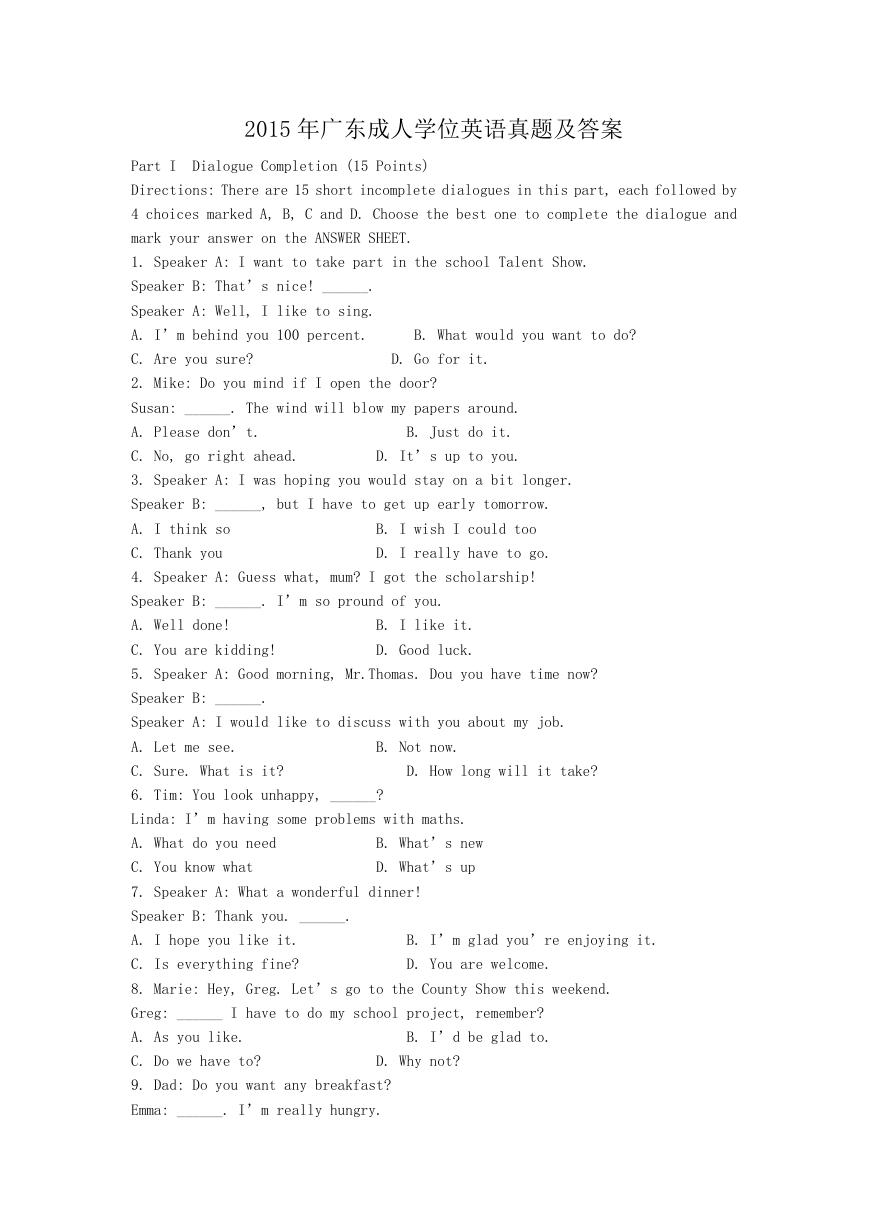
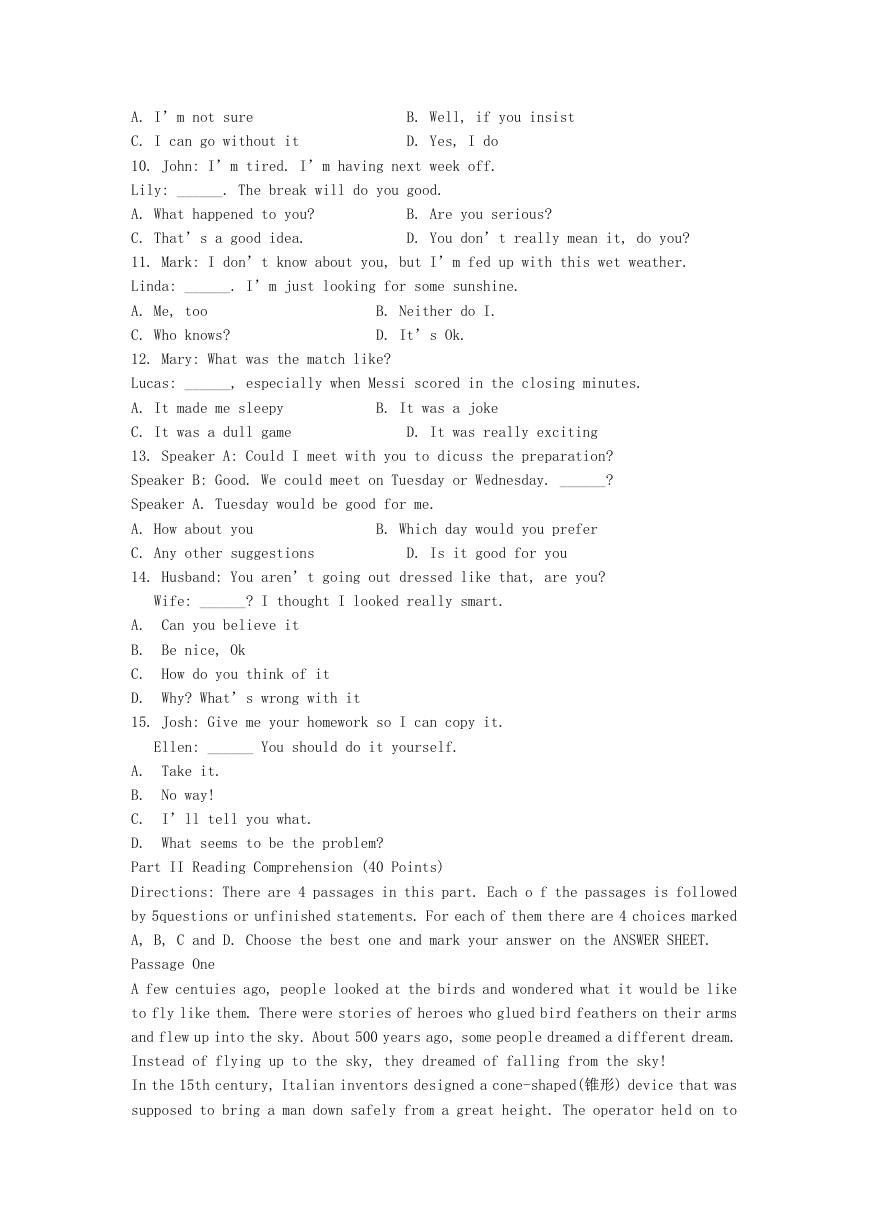
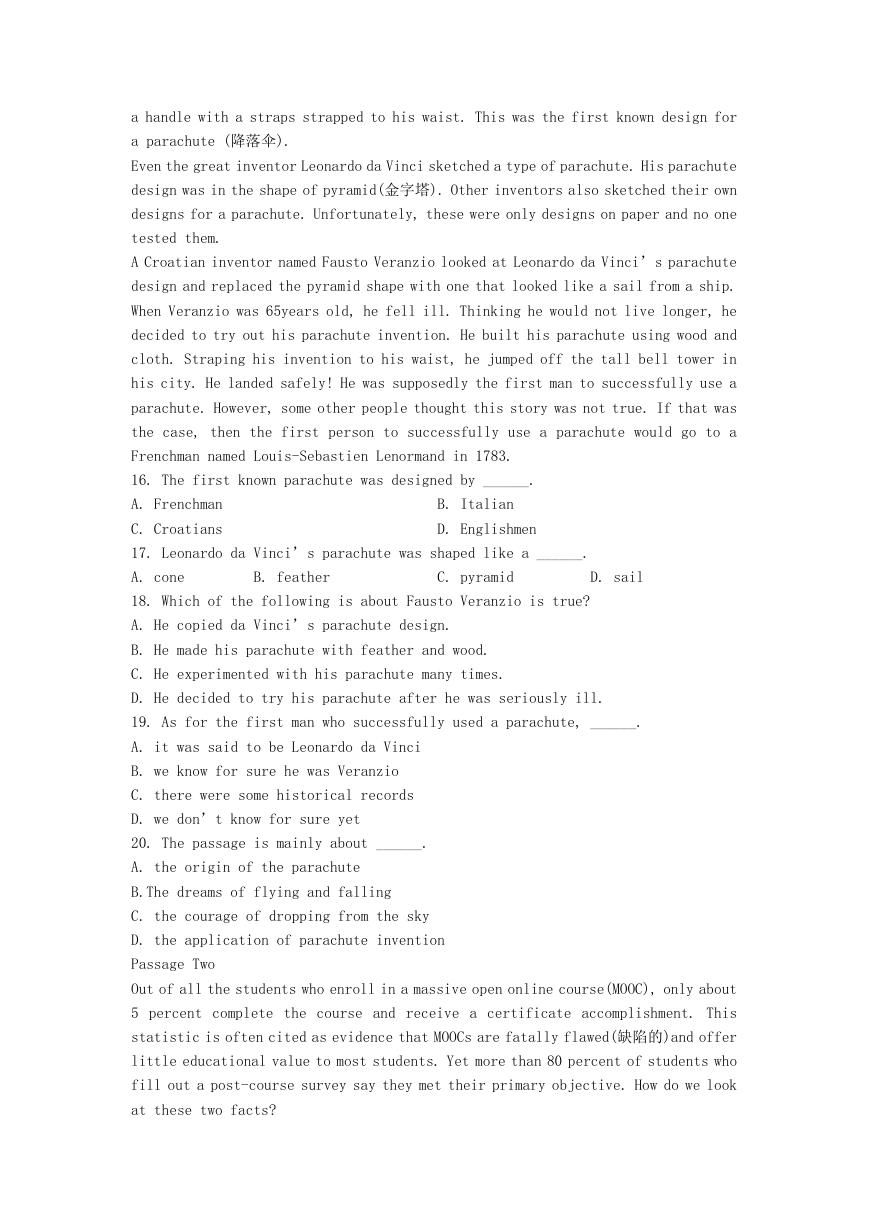
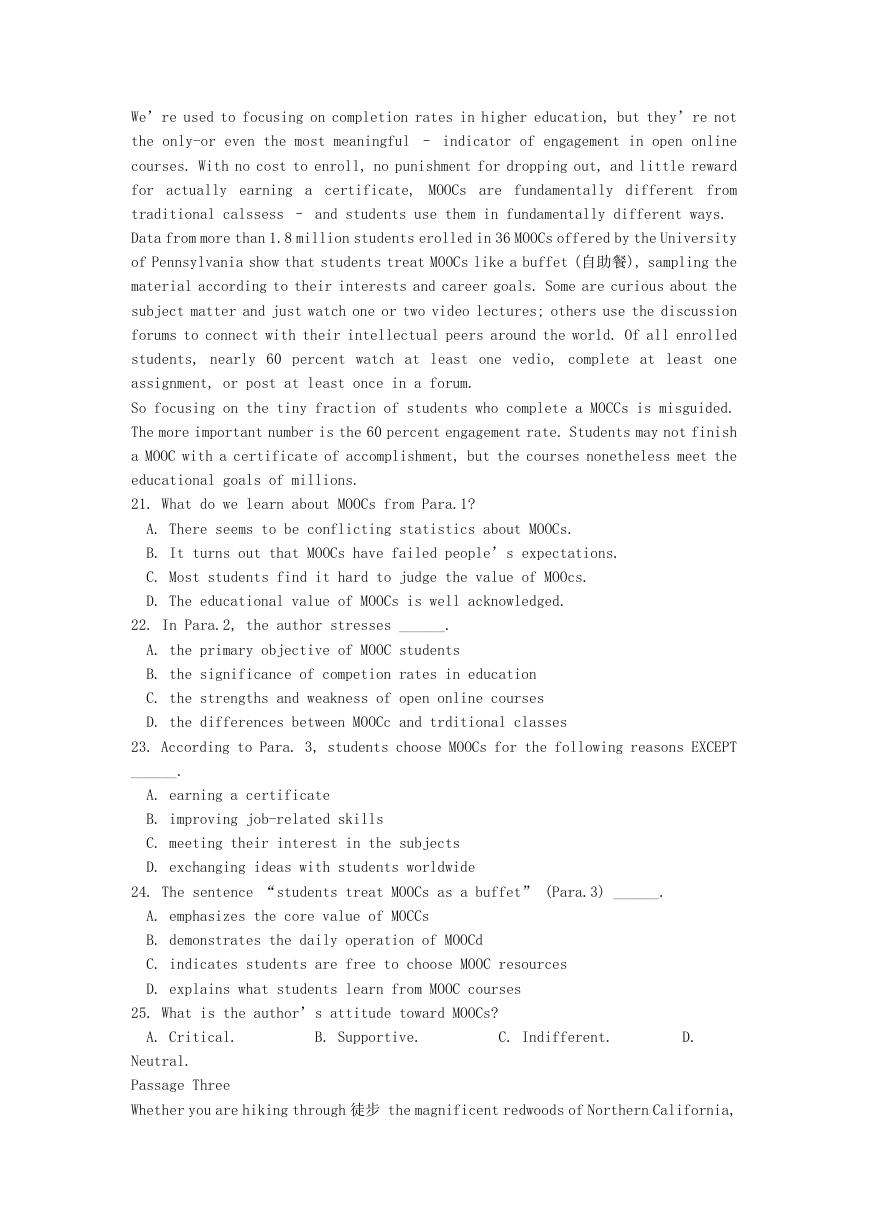
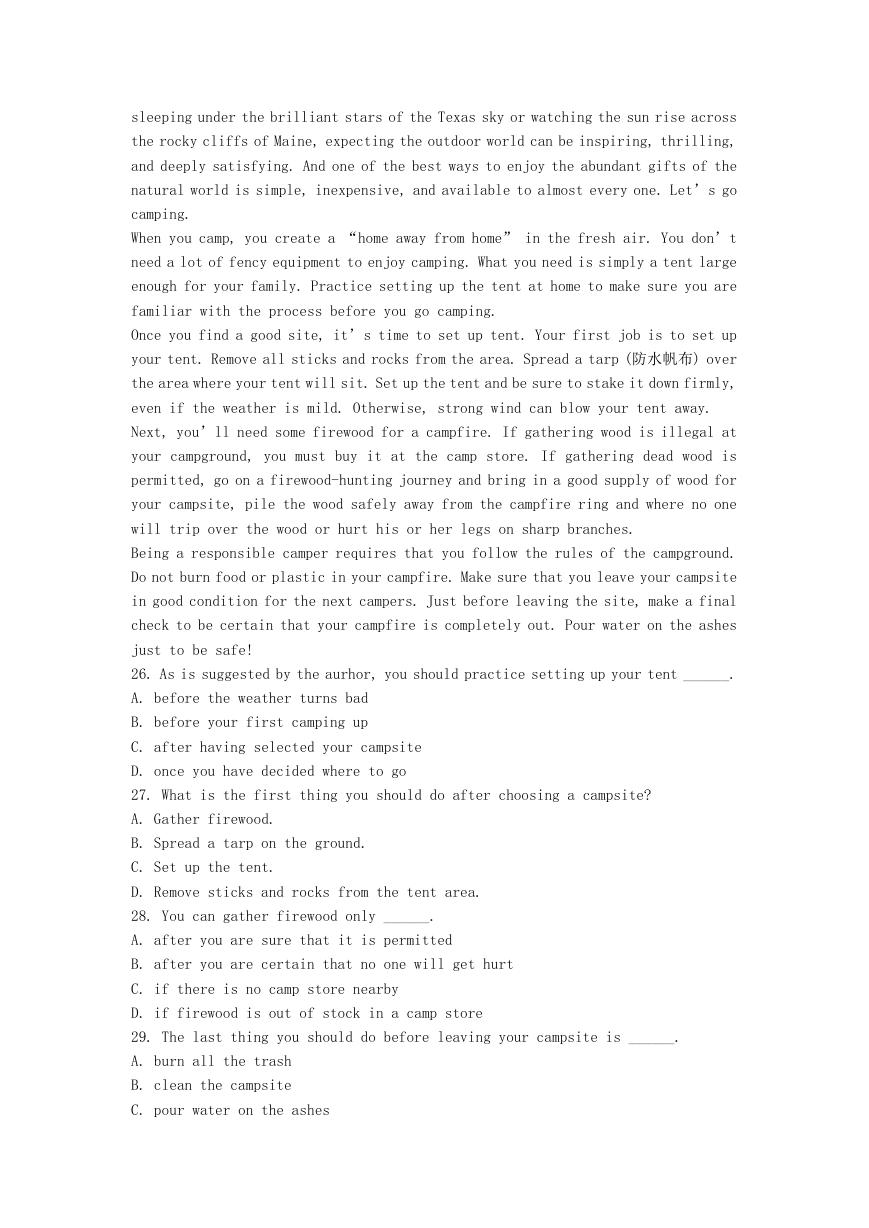

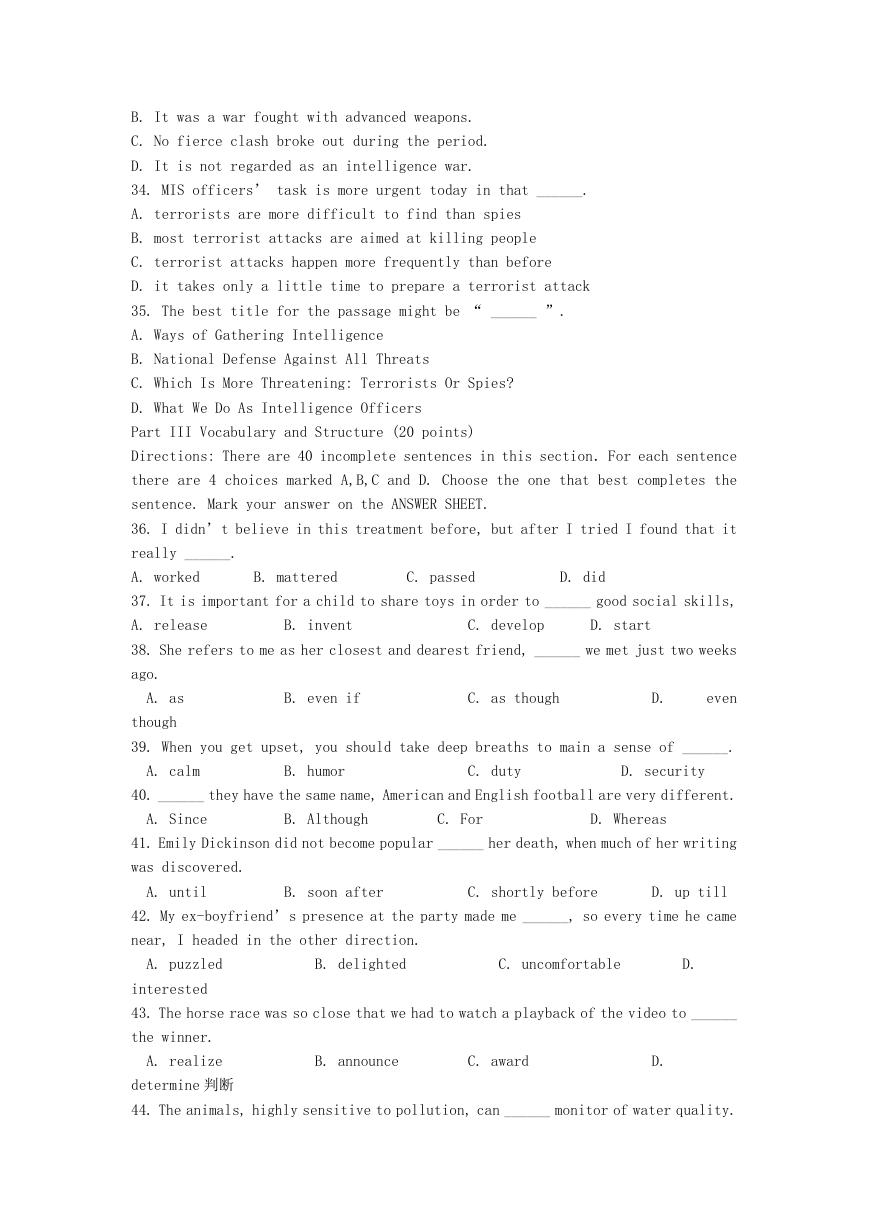









 2023年江西萍乡中考道德与法治真题及答案.doc
2023年江西萍乡中考道德与法治真题及答案.doc 2012年重庆南川中考生物真题及答案.doc
2012年重庆南川中考生物真题及答案.doc 2013年江西师范大学地理学综合及文艺理论基础考研真题.doc
2013年江西师范大学地理学综合及文艺理论基础考研真题.doc 2020年四川甘孜小升初语文真题及答案I卷.doc
2020年四川甘孜小升初语文真题及答案I卷.doc 2020年注册岩土工程师专业基础考试真题及答案.doc
2020年注册岩土工程师专业基础考试真题及答案.doc 2023-2024学年福建省厦门市九年级上学期数学月考试题及答案.doc
2023-2024学年福建省厦门市九年级上学期数学月考试题及答案.doc 2021-2022学年辽宁省沈阳市大东区九年级上学期语文期末试题及答案.doc
2021-2022学年辽宁省沈阳市大东区九年级上学期语文期末试题及答案.doc 2022-2023学年北京东城区初三第一学期物理期末试卷及答案.doc
2022-2023学年北京东城区初三第一学期物理期末试卷及答案.doc 2018上半年江西教师资格初中地理学科知识与教学能力真题及答案.doc
2018上半年江西教师资格初中地理学科知识与教学能力真题及答案.doc 2012年河北国家公务员申论考试真题及答案-省级.doc
2012年河北国家公务员申论考试真题及答案-省级.doc 2020-2021学年江苏省扬州市江都区邵樊片九年级上学期数学第一次质量检测试题及答案.doc
2020-2021学年江苏省扬州市江都区邵樊片九年级上学期数学第一次质量检测试题及答案.doc 2022下半年黑龙江教师资格证中学综合素质真题及答案.doc
2022下半年黑龙江教师资格证中学综合素质真题及答案.doc